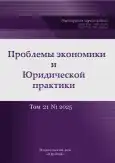Qualification Problems of Distinguishing a Gift from a Corruption Crime: Legislative Experience of the Republic of Belarus
- Authors: Kuznetsova O.A.1, Ploskunov M.S.1
-
Affiliations:
- Patrice Lumumba Peoples’ Friendship University of Russia
- Issue: Vol 21, No 1 (2025)
- Pages: 129-134
- Section: Criminal Law
- URL: https://journals.eco-vector.com/2541-8025/article/view/678482
- DOI: https://doi.org/10.33693/2541-8025-2025-21-1-129-134
- EDN: https://elibrary.ru/LEHHSJ
- ID: 678482
Cite item
Abstract
The article is devoted to the study of the issue of distinguishing the receipt of a gift from corruption crimes (bribes, illegal remuneration) according to the legislation of the Republic of Belarus. The provisions of the current civil legislation regulating the issues of donation are analyzed, their fundamental incompatibility with the definition of signs of illegal remuneration as a subject of bribery in accordance with the criminal law is shown. The opinions of a number of scientists and practitioners on the legal basis for determining the subject of a bribe and determining its size, which is necessary and sufficient for criminal prosecution, are considered. Considerable attention is paid to the differentiation of a bribe from a gift through the interpretation of the norms of civil and criminal legislation and some others.
Keywords
Full Text
About the authors
Olga A. Kuznetsova
Patrice Lumumba Peoples’ Friendship University of Russia
Author for correspondence.
Email: kuznetsova-ola@rudn.ru
ORCID iD: 0000-0003-1066-3783
SPIN-code: 8755-2997
Dr. Sci. (Law), Associate Professor, Head of the Department of Criminal Law, Criminal Procedure and Criminalistics of the Law Institute
Russian Federation, MoscowMaksim S. Ploskunov
Patrice Lumumba Peoples’ Friendship University of Russia
Email: PostLiveM1@gmail.com
SPIN-code: 6809-7774
Deputy Head of the Department of the Investigative Committee of the Republic of Belarus for the Brest Region (Brest, Republic of Belarus); Postgraduate Sudent of the Department of Criminal Law, Criminal Procedure and Criminalistics of the Law Institute
Rwanda, MoscowReferences
- Babij N. A. A bribe and a gift // Justicija Belarusi. 2010. N 7. pp. 26–30.
- Babij N. A. Qualification of bribery under the criminal law of Belarus and Russia [Text] : monograph / N. A. Babij. — Moscow : Yurlitinform, 2014 (Criminal Law); ISBN 978-5-4396-0539-2.
- Korsakov K.V. Adequacy and proportionality of prevention are key to the effectiveness of the fight against modern organized crime // Law enforcement agencies: theory and practice. 2015. — N 1. — P. 20.
- Pashhenko T. S. Gifts to budgetary medical workers from individuals in connection with the performance of professional duties [Electronic resource]. Konsul'tantPljus. Belarus' / OOO «JurSpektr». Nac. centr pravovoj informacii. Resp. Belarus'. — Minsk, 2024.
- Platon. Collected Works: in 4 vols.per. from Ancient Greek; ed. by A.F.Losev, V.F.Asmus, A.A.Takho-Godi. — Moscow: Mysl, 1994. — V. 4. — P. 421.
- Ploskunov M.S. Restrictions of public officials and employees of state bodies (organization) in receiving gifts / Actual problems of law [Electronic resource] : electronic collection of materials XXIV Resp. scientific-practical conf., Brest, April 28, 2023 / Brest. Pushkin State Univ. A. S. Pushkin ; edited by T. A. Gorupa, T. Z. Shalaeva. — Brest : BrSU, 2023. — pp. 19–22. ISBN 978-985-22-0155-1.
- Ploskunov M.S. Distinguishing a gift from a corruption offense / Investigative activity: science, education, practice : abstracts of reports of the IV International Scientific and Practical Conference (Minsk, September 6, 2024) / ed. by S.Ya. S.Y. Azemsha (chairman) et al. — Minsk : StroyMediaProject, 2024. — pp. 69–72. EDN: PDFGXF.
- Habarov A.V. Anti-corruption in the sphere of public administration: textbook / . — Tyumen, 2007. — P. 362. EDN: QQSGIZ.
Supplementary files









